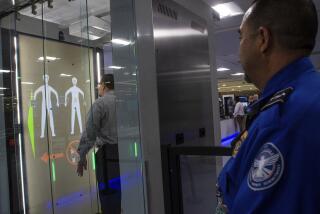Shut up and be scanned
Would you rather pose for a nude photograph or be groped by a federal employee? To hear many fliers these days, those are the only two choices for air passengers as the Transportation Security Administration installs full-body scanners at airports and introduces a more invasive pat-down technique that some have likened to sexual molestation. Weâre not wild about the new methods either, but theyâre a necessary evil in the era of suicide bombers who board planes with chemical explosives in their underwear.
Objections to the enhanced procedures are many and varied. Some center on the scanners, which are increasingly replacing metal detectors at airport terminals, and for good reason â old-style detectors canât find the plastic or chemical bombs favored by todayâs terrorists. Yet the new scanners effectively peer through passengersâ clothing, earning them the nickname âporno scannersâ from such groups as We Wonât Fly, a grass-roots consumer organization. Passengers fear that the nearly nude images will be saved and disseminated, or they are just uncomfortable with the idea of a security screener peering at their bodies. Others fret that the scanners pose a health risk. And then there are those, such as software engineer John Tyner, who refuse the scans, only to be confronted with an even worse alternative: the new TSA pat-down, which leaves no area of the body unexplored.
Tyner became a YouTube star last weekend after he recorded his encounter with security officers at San Diego International Airport on his cellphone and posted it online. In the audio-only recording, a TSA employee explains the search technique, which involves running a hand up the leg to the crotch in front and back, to which Tyner responds, âIf you touch my junk, Iâll have you arrested.â Things go downhill from there, with Tyner eventually being threatened with a civil lawsuit for leaving the terminal without submitting to the search. And although Tyner might now be the most famous search objector, he is far from the only one; the Electronic Privacy Information Center has filed suit claiming that the scans violate the 4th Amendmentâs ban on unreasonable searches, and airline pilots unions are complaining volubly.
Thereâs no bright line to indicate where our quest for security becomes intolerably invasive of our privacy, but weâre still pretty sure the TSA hasnât yet crossed it. Although the pat-downs are seriously embarrassing, theyâre also usually voluntary â to avoid them, you just have to go through the scanner. And fears about the scanners have been overblown.
Images from the scanners are viewed in a separate room by an officer who never sees the passenger, whose face is automatically blurred. The TSA says the images cannot be saved, stored or printed, but privacy advocates are skeptical; the U.S. Marshals Service admitted saving 35,000 images from a full-body scanner at a Florida courtroom this summer. Having seen the less-than-titillating images produced by the scanners, we doubt that theyâll show up on Internet porn sites anytime soon â or that even if they did, the subjects in them would be remotely recognizable.
Equally shrug-worthy are the complaints about safety. About half the machines being deployed use X-ray technology that exposes passengers to radiation, yet the amount is so tiny â it would take 5,000 trips through the scanner to equal the exposure of a single chest X-ray â that itâs hard to take seriously as a health risk. Fliers are exposed to cosmic radiation during their flights thatâs many times the level of exposure from the scanners.
The quest to keep up with terroristsâ shifting methods never ends; as soon as you block one potential attack route, terrorists often find another. In reaction to the new high-tech scans, suicide bombers may well switch to buses and trains rather than airplanes, or airborne killers might resort to inserting explosives into their body cavities, where the machines canât detect them. So, itâs reasonable to ask, whatâs next? Anal probes at the airport? Itâs safe to say that if the TSA gets to that point, it will have crossed the line, and it might be time to explore less invasive methods. Meanwhile, though, a full-body scan isnât a terribly high price to pay for a measure of peace of mind.
Of course, thatâs not good enough for groups like We Wonât Fly. It is promoting a mass protest on Nov. 24, the day before Thanksgiving, urging fliers to opt out of the full-body scanners. This will subject them to the far more intrusive and time-consuming pat-down instead, and if many people participate, it will render the traditionally long pre-Thanksgiving delays at airports positively unbearable â and all because a few excessively body-conscious individuals are uncomfortable with a scan thatâs little more taxing or dangerous than going through a metal detector. The new scans might not be foolproof, but theyâll spot more dangerous materials than the old detectors and keep passengers safer. If you canât handle such a minor inconvenience, perhaps you should stay on the ground.
More to Read
Inside the business of entertainment
The Wide Shot brings you news, analysis and insights on everything from streaming wars to production â and what it all means for the future.
You may occasionally receive promotional content from the Los Angeles Times.










